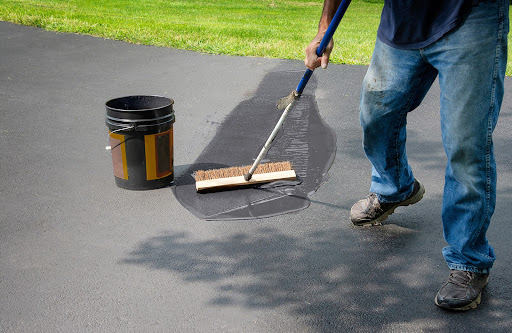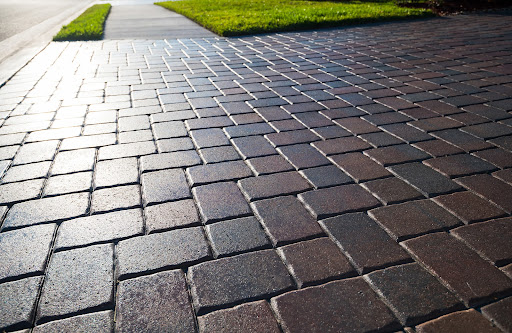
Sealcoating asphalt is a necessary component of maintaining pavement. With it, driveways may last longer than they should. They may form cracks that eventually become potholes. This can be inconvenient and expensive, as asphalt can cost a lot of money to repair or replace.
Before we explain why seal coating asphalt driveway pavements is important, we must first understand what it is. Sealcoating asphalt is simply a preventive maintenance measure that adds a layer of protection to the pavement. A seal coating essentially protects the asphalt from harmful elements.
An asphalt sealer is typically made of acrylic or bituminous-based products. It comes in a liquid formulation mixed with silica sand, water, polymer additives, and other solids and fillers. Driveway sealcoating is usually done through spraying or a squeegee. Ideally, it should also be done regularly to extend the life of the pavement.
Asphalt pavement has particular chemical properties and is mainly made of rock, gravel, stone, and binder. The binder, often called asphalt cement, holds the rock together so the asphalt is solid. This makes it crucial to maintain the integrity of the binder and prolong its lifespan.
Without proper maintenance, rain, chemicals, and U.V. rays may penetrate and degrade the binder in the asphalt. Water is especially harmful as it’s one of the leading causes of asphalt deterioration. When these penetrate the pavement, the surface will become brittle and eventually break down. As a result, cracks and holes will form in the asphalt.
The pavement becomes even more vulnerable to elemental damage when cracks and holes form in the asphalt. Water, ice, and oil can enter and further degrade the asphalt, resulting in more serious impairments.
This is where asphalt driveway sealcoating comes in. It blocks out the elements like water, U.V. rays, and oil so they don’t damage the pavement. Sealcoating is effective at extending the lifespan of pavement even if the asphalt is already in poor condition.
Moreover, sealcoating asphalt according to the manufacturer’s specifications, leaves a beautiful black finish, making the driveway look more premium. An asphalt driveway sealer can also make the pavement slip resistant. This makes driving and walking along much safer, especially on rainy days.
Sealcoating asphalt must be done regularly to be effective. But, the frequency will depend on pavement conditions and climate. If the pavement is in an area that experiences four seasons, sealcoating must be done more often. However, if the climate is dry and mild, the pavement does not need to be frequently seal coated.
In general, it’s best to seal coat a driveway or parking lot every two or three years. But, if the driveway is in poorer condition, it may need seal coating yearly or as needed. Remember to assess whether the driveway is gray, weathered, or has hairline cracks to determine how often it needs sealcoating.
On average, driveway sealing costs between $0.15 to $0.35 per square foot, but the price will depend on the driveway’s condition. It will also hinge on how many coats you must apply and whether the sealer is eco-friendly.
For the most part, residential driveways will cost $100 to $190 to seal. Meanwhile, it may only cost $100 for patios and walkways. For larger areas like basketball courts, sealcoating asphalt can cost $600 to $1,000. On an even large scale, like a parking lot, it may cost $7,400 to $10,400 per acre.
Eager to jump in and protect your pavement? Here’s how to sealcoat an asphalt driveway the right way.
If there are cracks in the pavement, make sure to fill them properly before applying a sealer. Refrain from relying on the sealer to fill the cracks you find. A sealer is not meant to fill cracks and holes so remember to use a pothole filler first.
In addition, make sure to have the right timing. It’s best to apply the sealer when there is dry weather for at least two days. Otherwise, the rain might wash away the sealer. The temperature must also be above 50°F during the sealing period and throughout the night. Don’t seal pavements on scorching hot days, as the sealer may dry too quickly.
The sealer may only stick to the asphalt if the driveway is clean. As such, cleaning the pavement before you start sealing is best.
Use a soap nozzle on a power washer or hose applicator to clean the driveway. Then scrub the entire surface using a stiff push broom. Afterward, flush the dirt and soap using a 40-degree power washer nozzle. You can also use a strong water stream from a garden hose. Rinse the driveway with clear water and let it dry completely. Then sweep the area with a broom.
Driveways and parking lots are bound to have oil stains. Remember to pour oil spot primer on the areas with oil stains. Brush the primer into the pores using a disposable chip brush. Then apply a second coat to more stubborn stains. Let the primer dry completely.
Open the bucket of sealer and pour it from one side of the driveway to the other. Make sure to pour a stream of sealer that is 6 inches wide. Then use a squeegee tool or wide broom to spread the sealer into a thin layer.
If you need more sealer, remember to apply it in 6-inch strips across the driveway. Work quickly so that each layer blends evenly for the first coat. Then let the driveway dry completely with the sealer. Once dry, apply the second coat in the same way.
After applying two coats, let the seal coat cure for at least 24 hours. Do not let any person or vehicle cross the driveway while it is curing. Only allow traffic back on the service after the curing period.

Sealcoating asphalt is a cost-effective way to protect your driveway. It extends the life of your pavement for years to come. This allows you to save money on repairs or even asphalt replacements. Sealcoating also makes the driveway look more appealing through its natural dark finish.
But seal coating can be tricky to do so yourself. Remember to call a professional to apply the sealer correctly when in doubt.